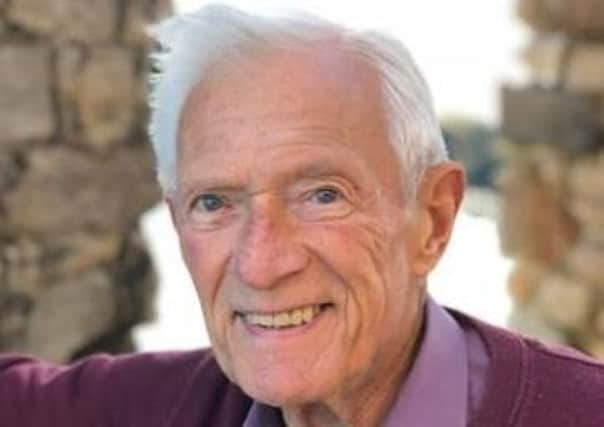Obituary: Alan Witcutt, Scot who forgave sniper who killed his wife


‘I’m not the hero, those are the heroes.” The words of Colonel Bob Stewart, the UK’s top military Commander in Bosnia, pointing an inquisitive reporter towards a silver-haired 63 year-old man in ITV’s television studios.
Alan Witcutt, who died just two weeks short of his 90th birthday, had been invited on the show to talk about forgiveness, a complex fusion of his own traumatic experiences as an aid worker in Bosnia and his deep Christian faith.
Advertisement
Hide AdAdvertisement
Hide AdAlan was born in 1930, in Albany, New York, the only child of Jack and Mabel Witcutt. His family, who had crossed the Atlantic seeking a better life, were, however, to return with three year-old Alan as victims of the Great Depression. After years of great poverty living in Netherton, Wishaw his father found work as an electrician at a local steelworks and Alan enjoyed a happy but humble childhood, which instilled in him a lifelong approach to recycling, reusing and repairing. Nothing was thrown out in Alan’s house – not even the corked wine!
During the Second World War the young Alan would collect military memorabilia and spent bullet casings from the nearby US Army camp, igniting an interest in weapons and guns that he would have throughout his life.
Educated at Netherton Primary and Wishaw High –schools to which he would return many times in later life – Alan went on to train as a bricklayer at Coatbridge Technical College.
In 1948, Alan, a devout Christadelphian, was called up for National Service. An appeal to be treated as a conscientious objector on religious grounds was rejected and he was sent to work in Polkemmet Colliery. In the raw emotion of the post-war years his conscientious stance attracted much community hostility but, in the pits, he found acceptance and respect for the dangerous work he was doing there.
After the darkness of the pits, Alan enjoyed many happy years in the countryside as a Driver Librarian with Lanark County before being medically retired in the late 1980s.
Alan met his wife Christine Taylor through their membership of the Christadelphian Church and they married in 1966. Christine, a local primary school teacher, and Alan were to have two children, Paul and Julie, and would eventually move into the family home in Netherton.
It was on Christine’s retirement that things would change dramatically. The couple joined Edinburgh Direct Aid, a small charity that was taking aid to the war-ravaged Balkan region. Alan’s HGV licence was particularly useful. In 1992, the couple joined other volunteers in a small aid convoy delivering food and clothes from Scotland to the desperate people of Bosnia, one of the most dangerous places in the world.
After their first “convoy” the couple delivered talks on their experiences, Christine talking to Alan’s slides – Alan preferring to stay behind the projector, comfortable for his wife do the public speaking.
Advertisement
Hide AdAdvertisement
Hide AdIn July 1993 the couple returned to Bosnia. This time as they left besieged Sarajevo in their empty trucks, Christine was fatally shot by a Bosnian Serb sniper. Alan, in the truck in front, knew something terrible had happened and was taken with Christine in a CNN-armoured jeep to a nearby military hospital. Her death had been instantaneous. Alan returned with Christine’s body on a military flight, home to Scotland and their devastated family.
It was assumed that this would be the end of Edinburgh Direct Aid – but Alan couldn’t let it stop there. He urged the charity to keep going and then, perhaps most remarkably of all, asked for forgiveness for the sniper who had killed his wife.
His humanity and his Christianity became an inspiration to many and he was soon to find himself delivering talks and sermons on the subject of forgiveness, some of which have been recorded in the National Library of Scotland. Alan stepped out from behind the projector and began to deliver talks on his experience, the plight of Bosnians and his message of forgiveness. He co-authored the book, Flakjacket and Lipstick with Christine’s brother, Alistair Taylor.
In 2001 Alan returned to Sarajevo with his family to open a centre and outreach programme for children with complex support needs. The projects were funded by a separate charity, The Christine Witcutt Fund, which was established in his wife’s memory and for which he raised large amounts of money.
Alan continued to deliver lectures and informal talks right up till his death. He received awards and recognition locally and in 2005 was presented with a medal by the Bosnian Government for the humanitarian work done by him and Christine.
In his later years Alan lived a healthy and active life. Every winter he would move to New Zealand to live with his son and granddaughter. He enjoyed kayaking and, back home, walking and cycling with three of his elderly friends, earning them the local nickname, “Last of the Summer Wine”. There was no question of which one of them was “Compo”!
In 2019 Alan published his memoirs, Nine Lives And More, with all proceeds going to his wife’s charity. They captured an extraordinary life and a fascinating insight into a complex, devout and principled man.
Alan is survived by his son Paul and daughter Julie and grandchildren Stephanie, Holly and Rory.
DAVID HAMILTON
Comments
Want to join the conversation? Please or to comment on this article.